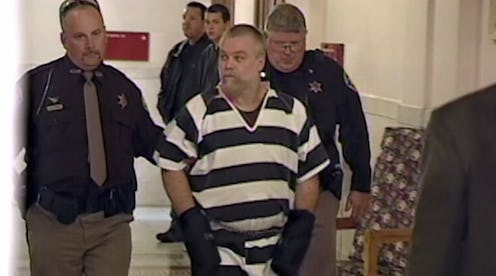News
The Evidence 'Making A Murderer' Left Out

As Making a Murderer continues to enrapture the country with the strange and tragic story of Steven Avery, supporting figures in his trial are becoming Internet stars in their own right. Along with Avery's defense attorneys, Dean Strang and Jerry Buting — the two unlikely heartthrobs are now a bona fide meme — local reporter Angenette Levy has also stood out to viewers as a tough but fair journalist looking for answers. In a new interview, Levy talked about Making a Murderer with Rolling Stone , revealing some crucial evidence that was left out of the Netflix series.
Levy caught the attention of viewers when she appeared in scenes in the press room, asking hard-hitting questions of both the prosecution and defense. Rolling Stone recently caught up with the journalist, who is now an evening news reporter in Cincinnati, to get her take on the 10-part documentary. The most significant revelation from the interview is the key evidence in the case which Levy said the series left out. For example, Avery reportedly requested that Teresa Halbach come to his car yard on the day of her disappearance. Levy told Rolling Stone:
I was surprised that there were some things that weren't in there. For instance, there were some things that weren't in there about Steven Avery requesting Teresa Halbach that day ... There was testimony to that effect during the trial, that he had specifically requested her, and that she had been there many times before, photographing the vehicles.
According to court testimony, Avery reportedly called Halbach's office three times to specifically request "the photographer who had been out to the property previously" (Halbach had visited Avery's yard six times that year to photograph vehicles for Auto Trader magazine). The prosecutors argued that Avery knew that Halbach felt uncomfortable around him because he had previously answered the door for her wearing nothing but a towel, and that's why he used his sister's name to request the photographer on that fateful day. Prosecutors also claimed that was why Avery used the star-67 feature (which blocks a caller's identity) for two of the three calls.
Given the gaps of evidence on the show, interviewer Lauren Kelley asked Levy whether she thought the series presented the trial fairly. Like a good journalist, Levy remained neutral:
I don't want to go back and forth about whether or not it was fair. I feel like that's best left to the attorneys. There were certainly some things that I didn't see in there that were presented during the trial. But it was a six-week trial. There was a lot that went on during that trial.
It is this impartial and no-nonsense attitude that made Levy a fan favorite. But she maintains that she was just doing her job:
It may come across as entertaining in the documentary, but this was serious. These are people's lives at stake.
Images: Netflix (2)